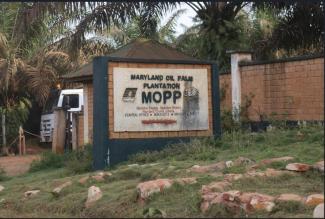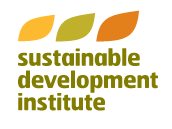
Maryland Oil Palm Plantation (MOPP) and Project Affected Communities (PACs) are now strengthening their relationship following persistent interventions from the Sustainable Development Institute (SDI).
With funding support from the Green Livelihoods Alliance (GLA 2.0) Forest for a Just Future Program (FfJF), the SDI and Milieudefensie conducted a research on the operations of MOPP in 2022.
Findings from the research were released in February 2023. The findings showed social and environmental harms at the Maryland Oil Palm Plantation (MOPP).
Despite these social and environmental harms by the company, the research also highlighted the failure of the company to sign a Memorandum of Understanding (MOU) with the Project Affected Communities (PACs) which will pave the way for other development activities in these communities and economic empowerment since they have nowhere to even farm again.
As part of the constant engagements, the Community Rights and Corporate Governance Program (CRCGP) of the Sustainable Development Institute (SDI) in May 2023 held a one-day dialogue between the 15 Project Affected Communities (PACs) and Maryland Oil Palm Plantation (MOPP).
At the end of the daylong meeting, members of the affected communities listed the challenges they faced relative to the operations of the MOPP management. On the other hand, the management of MOPP in another group listed the challenges they face as a result of the community’s actions towards the plantation.
However, the Secretary General of the Community Development Fund (CDF) Committee has excitedly lauded the SDI and its partner, saying after the dialogue, communication between the Project Affected Communities (PACs) and MOPP management has improved. Amos Kuoh said, “It is the first time that the CDF committee submitted its request to have a General Assembly, and the request was honored by the management of MOPP without delay and the General Assembly was held.”
“In the General Assembly, the affected communities agreed on the following: (1) the communities agreed to start their smallholder program. They want to use part of their CDF money to buy the palm kernel from Ivory Coast. They also agreed that a school is built in Gbololu, one of the far-away affected communities from their CDF money,” he said.
Meanwhile, the committee wants SDI with support from the National Bureau of Concession (NBC) to prevail upon MOPP to adhere to the resolution from their just-ended General Assembly.
The dialogue allows stakeholders with common interests to hear from each other, discuss and agree on actions that will engender honest information exchange, strengthen social and civil engagement, and create the space for development opportunities. The dialogue is part of the Green Livelihoods Alliance (GLA 2.0) Forest for Just Future activities.
Participants in the meeting in Pleebo City, Maryland County include the Paramount chief, Clan chiefs, Pleebo Youth President, General town chiefs, youth leaders, women leaders, head of the Community Representative Committee, Head of the Community Liaison committees, SASI, and the MSP head of Maryland County and the company.
It was also witnessed by the head of CSOs in Maryland, Mr. Thomas Marwolo, and the district superintendent of Pleebo district. Representing the Maryland Oil Palm company were: The Director of Press and Communications, Mr. Martin Nyeka; the Project Manager, B. Lussini Gibson; and Mr. Joseph Allison of the Sustainability Department.
MOPP is situated in the county of Maryland close to the border with Ivory Coast. It is owned by SIFCA, a leading Ivorian Agribusiness group. Wilmar owns part of this group and its refinery, where MOPP products are refined. Wilmar is one of the largest Agri-businesses in the world. The African, French, and Dutch development banks invested in SIFCA and a range of Asian, UK, US, and French financiers are exposed to the harms on the MOPP plantations through their financing of Wilmar.
This initiative seeks to create a platform where both the communities affected by MOPP’s activities and MOPP can dialogue and share information that will promote social cohesion and protect the rights of communities.
